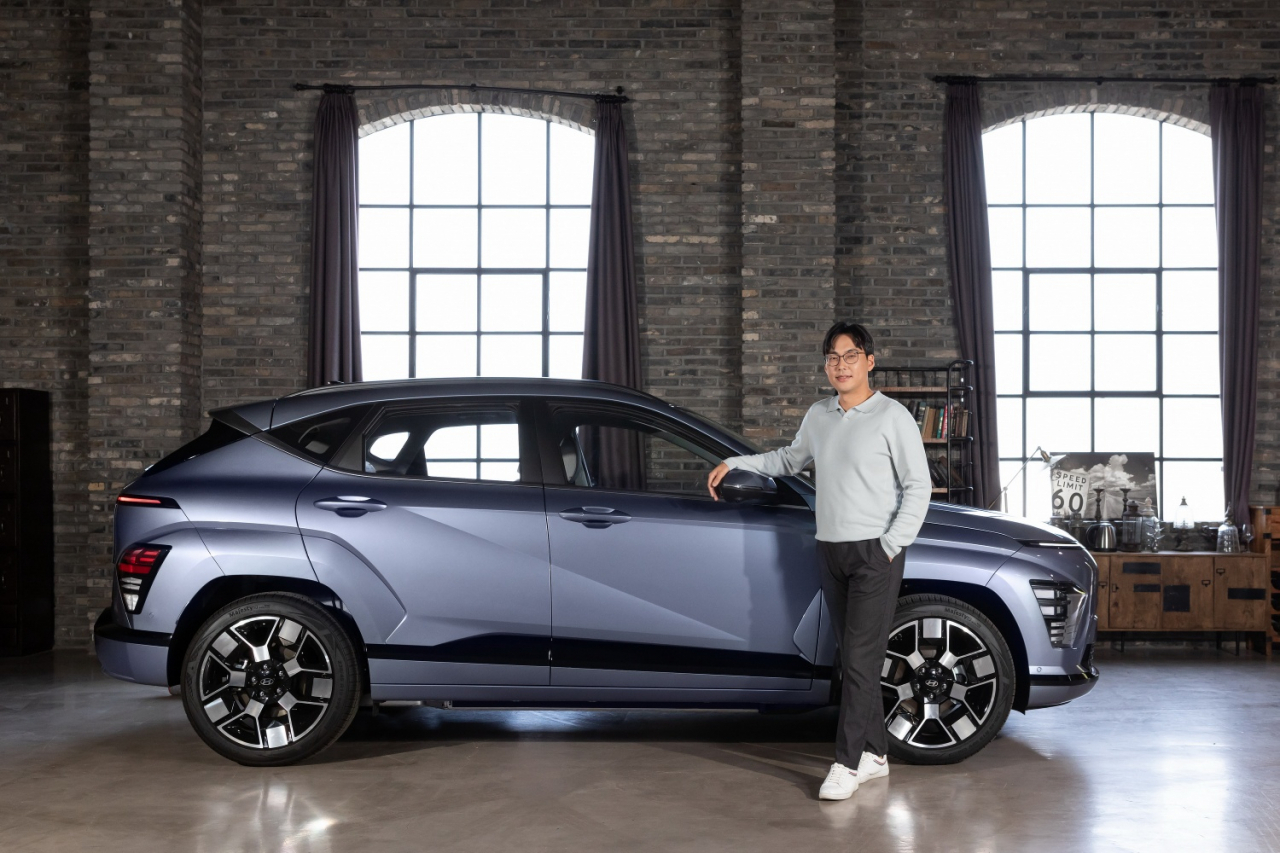[Herald Interview] Kona Electric comes back stronger, cheaper
CATL battery pack to enhance car’s competitiveness in Korea, US, says Hyundai product development manager
By Byun Hye-jinPublished : April 30, 2023 - 17:57

Hyundai Motor’s all-electric compact sport utility vehicle Kona has returned to the market after a yearslong hiatus. Its first-generation model was suspended in 2019 following a series of battery fires, leading to a 1.4 trillion won ($1 billion) recall of some 80,000 vehicles.
For the vehicle's second generation, dubbed the All New Kona Electric, the carmaker has teamed up with Chinese battery giant CATL to enhance safety while minimizing price hikes, according to Hyundai’s product development manager Lee Yong-hoon.
He dismissed concerns over the product quality of Chinese-made batteries, noting that "they are competitive enough to offer a sufficient driving range of up to 412 kilometers on a single charge. We also guarantee battery safety.”
Replacing its battery supplier is also part of a strategic shift in pricing, he said, citing heated competition in the soaring small-sized SUV market. The first-generation Kona Electric used a pricier battery pack produced by LG Energy Solution, the nation’s top battery maker.
With a cheaper battery pack, the new Kona Electric is priced at 46.5 million won to 53.2 million won. With a government subsidy for EVs, the actual purchase price stands at about 30 million won. Despite its EV appeal, its price is still higher than rival models like General Motors’ Trax crossover, which is sold at between 20.5 million won to 27.4 million won.
But Lee stressed that the carmaker raised the car prices by 6.7 to 8.8 percent compared to the previous model launched in 2018, almost half the average price hike of 15.1 percent in all Hyundai cars since 2020.
“Of course, selling the cheapest EVs is not our top priority. We also made efforts to redefine how entry-level EVs should be to meet high consumer expectations,” Lee added.
The new Kona Electric has undergone several upgrades after paying heed to customer feedback.
Its upgraded battery management system maintains the battery at the optimal temperature before charging, regardless of weather conditions, which is helpful to prevent batteries from catching fire. Drivers can simply click on the head-up display to start the process.
For an enhanced driving experience, the car adopted higher levels of assisted driving with Forward Collision-Avoidance Assist 2 and Highway Driving Assist 2. The noise level has also been drastically lowered by using noise-reduction tires.
The car boasts roomy passenger seats, having adjusted the overall height of the car and the battery pack, along with a spacious trunk and other storage spaces.
The car is also equipped with vehicle-to-lead or V2L, which enables EVs to use stored energy to power external electronic devices such as mobile devices and electronic camping equipment. This feature is expected to appeal to campers who are also key consumers of compact SUVs.
The new Kona Electric, launched in Korea on April 13, is set to make its debut in the US and Europe in the coming months. Hyundai is especially looking to expand its presence in Europe’s burgeoning EV market. The models sold in Europe will continue using LG Energy Solution batteries.







![[Graphic News] More Koreans say they plan long-distance trips this year](http://res.heraldm.com/phpwas/restmb_idxmake.php?idx=644&simg=/content/image/2024/04/17/20240417050828_0.gif&u=)
![[KH Explains] Hyundai's full hybrid edge to pay off amid slow transition to pure EVs](http://res.heraldm.com/phpwas/restmb_idxmake.php?idx=644&simg=/content/image/2024/04/18/20240418050645_0.jpg&u=20240419100350)






![[From the Scene] Monks, Buddhists hail return of remains of Buddhas](http://res.heraldm.com/phpwas/restmb_idxmake.php?idx=652&simg=/content/image/2024/04/19/20240419050617_0.jpg&u=20240419175937)

![[KH Explains] Hyundai's full hybrid edge to pay off amid slow transition to pure EVs](http://res.heraldm.com/phpwas/restmb_idxmake.php?idx=652&simg=/content/image/2024/04/18/20240418050645_0.jpg&u=20240419100350)

![[Today’s K-pop] Illit drops debut single remix](http://res.heraldm.com/phpwas/restmb_idxmake.php?idx=642&simg=/content/image/2024/04/19/20240419050612_0.jpg&u=)